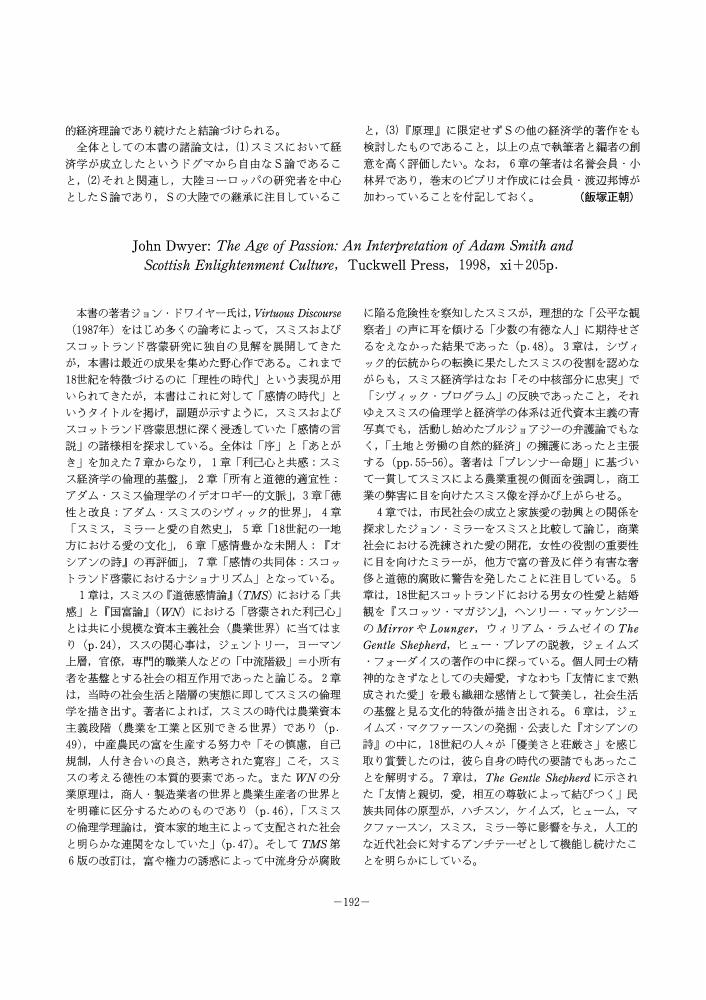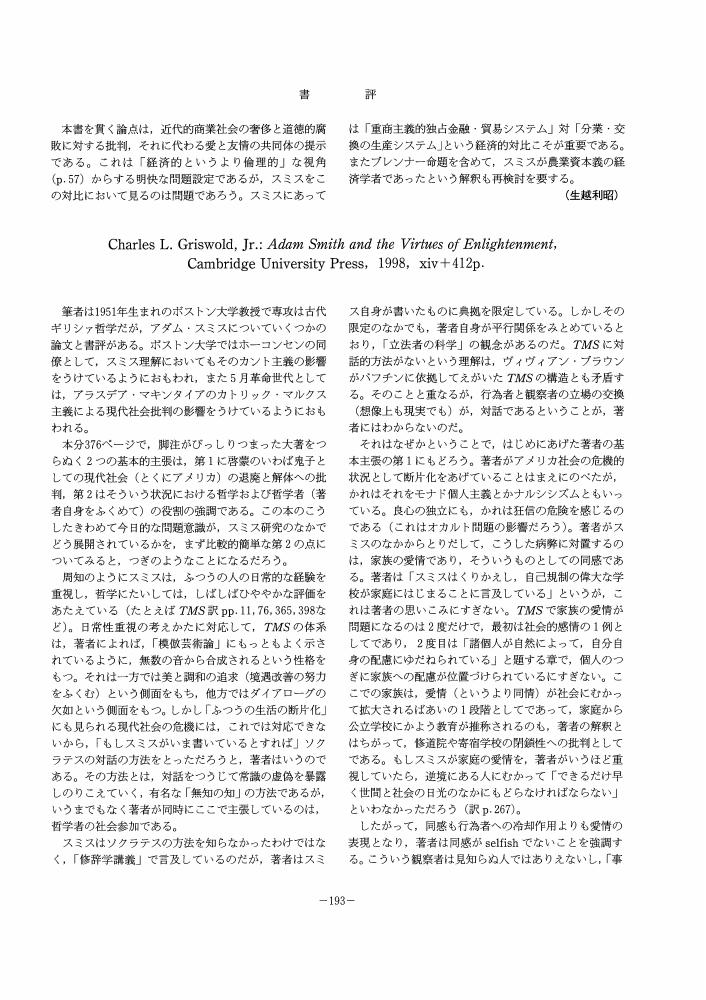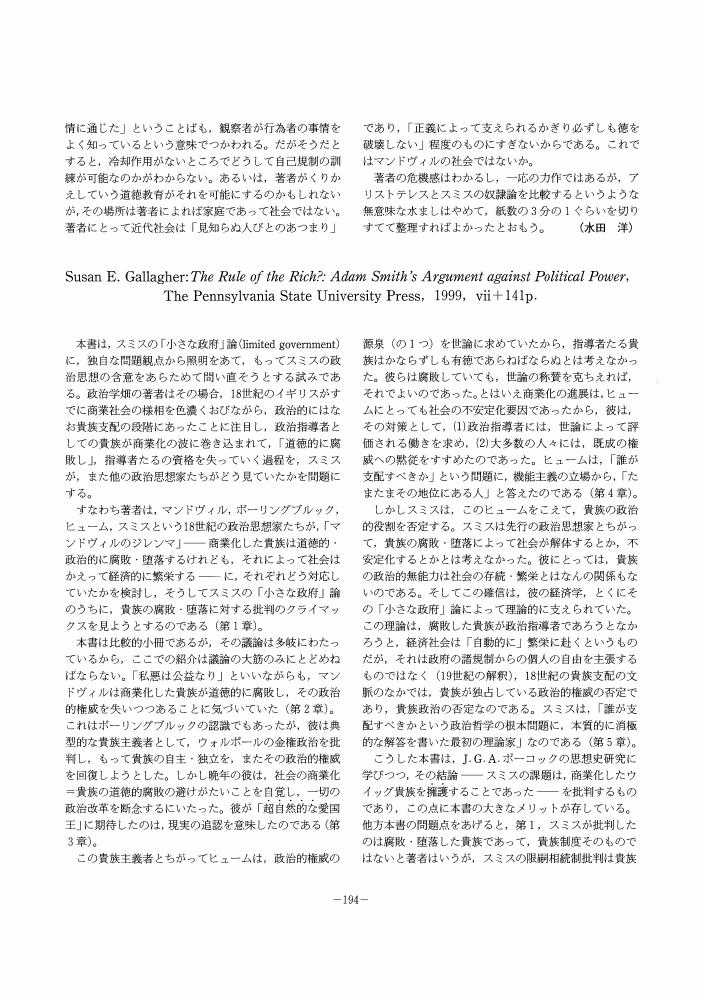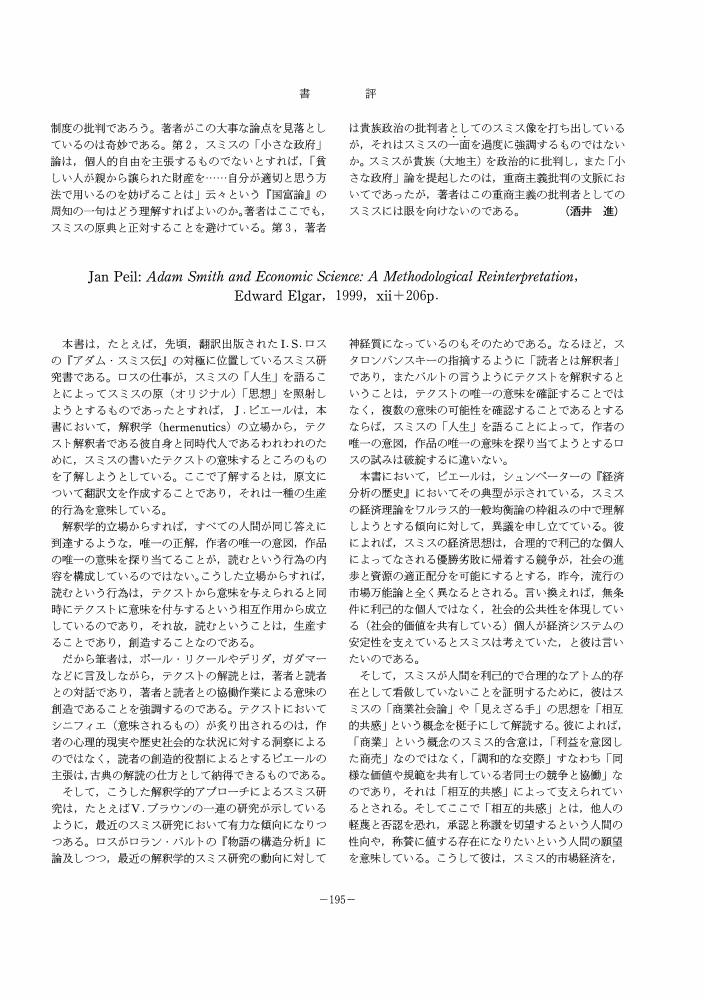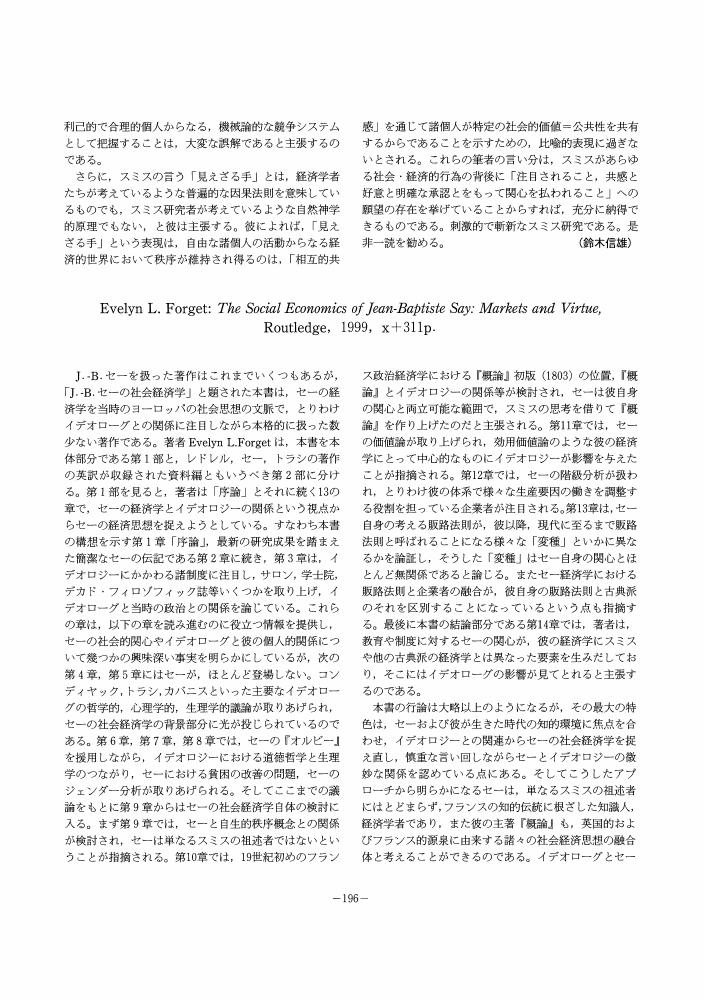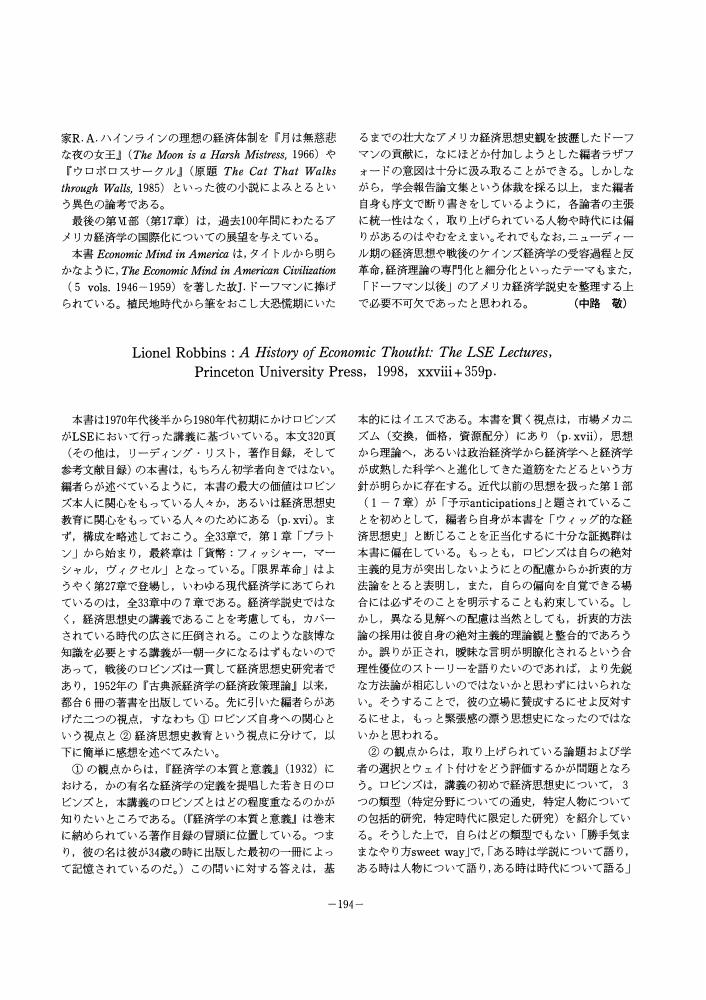- 著者
- 生越 利昭
- 出版者
- The Japanese Society for the History of Economic Thought
- 雑誌
- 経済学史学会年報 (ISSN:04534786)
- 巻号頁・発行日
- vol.38, no.38, pp.192-193, 2000 (Released:2010-08-05)
- 著者
- 水田 洋
- 出版者
- The Japanese Society for the History of Economic Thought
- 雑誌
- 経済学史学会年報 (ISSN:04534786)
- 巻号頁・発行日
- vol.38, no.38, pp.193-194, 2000 (Released:2010-08-05)
- 著者
- 酒井 進
- 出版者
- The Japanese Society for the History of Economic Thought
- 雑誌
- 経済学史学会年報 (ISSN:04534786)
- 巻号頁・発行日
- vol.38, no.38, pp.194-195, 2000 (Released:2010-08-05)
- 著者
- 鈴木 信雄
- 出版者
- The Japanese Society for the History of Economic Thought
- 雑誌
- 経済学史学会年報 (ISSN:04534786)
- 巻号頁・発行日
- vol.38, no.38, pp.195-196, 2000 (Released:2010-08-05)
- 著者
- 喜多 見洋
- 出版者
- The Japanese Society for the History of Economic Thought
- 雑誌
- 経済学史学会年報 (ISSN:04534786)
- 巻号頁・発行日
- vol.38, no.38, pp.196-197, 2000 (Released:2010-08-05)
1 0 0 0 OA ヒュームにおける「奢修」と文明社会
- 著者
- 壽里 竜
- 出版者
- The Japanese Society for the History of Economic Thought
- 雑誌
- 経済学史学会年報 (ISSN:04534786)
- 巻号頁・発行日
- vol.38, no.38, pp.98-110, 2000 (Released:2010-08-05)
David Hume's theory of luxury has been studied chiefly from the viewpoint of the history of economic theory, but its real importance can be understood only when it is placed in a wider historical context of morals and politics. Hume first attempts to clarify the interdependent relationships between specific moral characters and particular constitutional arrangements as demonstrated by the affinity between the virtue of industry and free government. He claims that the virtue of industry begins to degrade into corrupt forms of avarice and egoism when it overrides its proper limit of moderation. Hume's well-known attack upon the traditional notion of luxury and his vigorous defense of its modern notion as the refinement of arts entail another so-far neglected element of his skeptical attitude toward unregulated vicious forms of luxury. Hume employs the notion of “honour”, traditionally taken as one with the classical virtue of martial spirit, for strengthening those morally acceptable exertions of industry and for guaranteeing its socially beneficial consequences. This does not necessarily indicate a more pessimistic interpretation of Hume's theory of luxury than that so far accepted. Rather it argues in favor of Hume's overall strategy for the defense of modern civilization as the fundamental attack against both the classical and the modern extreme notions of luxury.
1 0 0 0 OA ジェイムズ・ステユアートの利子概念
- 著者
- 古谷 豊
- 出版者
- The Japanese Society for the History of Economic Thought
- 雑誌
- 経済学史学会年報 (ISSN:04534786)
- 巻号頁・発行日
- vol.38, no.38, pp.111-122, 2000 (Released:2010-08-05)
- 参考文献数
- 13
Over the last few years a considerable number of studies have been made on various problems regarding James Steuart's theory of interest. What seems to be lacking, however, is a study on the very nature of the “interest” concept in Steuart's theory.S. Okuda is among those who note that analysis on this subject is necessary for investigating other problems regarding Steuart's theory of interest. Steuart describes that a landed man, who received paper (money) for a land security has to pay interest to the bank because the paper “circulates like money, ” but the land does not. From this description, Okuda concluded that Steuart understood interest as the price for receiving the liquidity of money. And this idea is now widely accepted.There are some objections that can be raised against this interpretation. This conclusion is true for the landlords, but not for the industrious class, or the state. Here one gets a glimpse of the secret background of Steuart's “interest” concept. In Steuart's theory of political economy, the theory of interest is the base of the theory of credit, and Steuart argues the “interest” concept according to the structure of his theory of credit.
1 0 0 0 OA リカードの労働価値理論の論理構成
- 著者
- 福田 進治
- 出版者
- The Japanese Society for the History of Economic Thought
- 雑誌
- 経済学史学会年報 (ISSN:04534786)
- 巻号頁・発行日
- vol.38, no.38, pp.123-133, 2000 (Released:2010-08-05)
- 参考文献数
- 23
A task of this paper is to make clear a logical construction of David Ricardo's Pure Labour Theory of Value (LTV) which is formed under the condition that the capital structures are identical among production sectors.For this task, defining the basic formulation of the LTV, this paper first states that the theory is derived from a formulation that is defined by arranging Ricardo's arguments of value and price, and, second, the paper claims that the theory is formed by modeling a process of formation of a uniform rate of profit through capital transfers between production sectors. The paper makes clear that the more essential assumptions for the formation of the LTV are the formation of a uniform rate of profit among production sectors and the definition of the technical conditions of production in the sector producing money-good.The logic of the LTV establishes the principle that profits are determined as Surplus out of products, that in the logic of the LTV a level of general or uniform rate of profit is determined by the conditions of production in the sector producing money-good as a main factor, and that the LTV is formed on certain assumptions whether demand and supply are equal or not in each production sector. In these implications the LTV is one basic style of real cost theory for the determination of prices.
1 0 0 0 OA ケインズの金融的動機
- 著者
- 内藤 敦之
- 出版者
- The Japanese Society for the History of Economic Thought
- 雑誌
- 経済学史学会年報 (ISSN:04534786)
- 巻号頁・発行日
- vol.38, no.38, pp.146-157, 2000 (Released:2010-08-05)
- 参考文献数
- 28
After publishing the General Theory, Keynes introduced a fourth motive of holding money called the ‘finance motive.’ There are not many studies on Keynes's articles after 1937 by historians of economic thought, but there are by comparison many papers by Post Keynesians. First, in this paper I investigate the process of formation of the finance motive according to Ohlin's critiques. Second, I explore the controversy between Keynes and Robertson. Third, I consider the relationship of Post Keynesian interpretation to the controversy between Keynes and Robertson, and last, I examine the position of the finance motive.The conclusions of this paper are: First, the finance motive is introduced by responding to Ohlin's critiques and is considered to be a concession to Ohlin, but the core of liquidity preference theory is not revised. Second, Robertson's critique shows that the banking system can be illiquid, but the reason for Keynes's neglect of Robertson's critique is that Keynes implicitly considered the case of endogenous money supply. Third, the view of regarding the finance motive as a fourth motive is more close to Keynes's aim than is the view of connecting the finance motive and the transactions motive.
1 0 0 0 OA 日本経済思想史研究のこれまでと今
- 著者
- 杉原 四郎
- 出版者
- The Japanese Society for the History of Economic Thought
- 雑誌
- 経済学史学会年報 (ISSN:04534786)
- 巻号頁・発行日
- vol.38, no.38, pp.28-36, 2000 (Released:2010-08-05)
- 参考文献数
- 9
In his pioneering synthesis, published in 1962, on the Japanese political economists of the Tokugawa (1603-1868) and the Meiji (1868-1912) periods, Eijiro Honjo outlined the development of the study of the history of Japanese economic thought in evolutionary stages. Starting from its beginning in the Meiji, he argued that a foundation was laid for the study of the Tokugawa economic thought in the Taisho (1912-1925) period, while the Meiji economic thought began to become a serious subject of study in the early Showa period, and prewar socialist and Marxist thoughts after the Second World War. Thus the field exhibited a steady expansion in terms of the scope of the subject, the number of scholars and the number of works published. However, Honjo also commented that such a development was dwarfed by the publication of a much larger number of works on the history of Western economic thought, because Japanese universities offered research and teaching posts for the latter, but seldom for the former.This was indeed the case at least up to the 1960s. The History of Economic Thought Society of Japan started in 1950 with 123 members, but the total number of papers presented at the Society's biannual meetings on Japanese history during the first five years was as little as seven. Central themes chosen in these meetings usually related to the history of classical political economy and Marxian economics. Almost no attempts had been made to take up a theme centring on Japan. Some members, including myself, did express concern about this state of affairs. Thus, after returning from the study in Europe in 1957-58, I tried to arouse interest in the subject by starting a newsletter for the Kansai branch of the Society in 1959. In 1966-69 a number of researchers, led by Tsuneo Hori, joined the government-funded project on the study of the history of Japanese modernisation since the Meiji, which greatly helped promote the field.At its 42nd meeting in November 1978, the Society chose the history of modern Japanese economic thought as a central theme for the first time. The three papers presented in the session discussed the thought and activities of Yukichi Fukuzawa, Shiro Shiba and the Japan Society of Social Policy, respectively, and another three papers on the Tokugawa economic thought were presented in the subsequent individual sessions of this meeting. Reflecting the growth of the number of people seriously interested in the field, this meeting signified the Society's open acknowledgement of the central importance of the study of the Japanese experience for the discipline as a whole. Since then the Society has organised three major publications, each marking the steady development of the field; Nihon no Keizaigaku (The Political Economy in Japan) (1984), Keizaigakushi: Kadai to Tenbo (The History of the Political Economy: Its Missions and Prospects) (1992) and Economic Thought and Modernisation in Japan (1998). Furthermore, the Society's 63rd meeting in November 1999 showed a high standard of scholarship, making the future of the field appear promising. Four excellent papers were presented by the younger generation of scholars, with new source material and perspectives. I could not help recalling Honjo's lecture delivered 60 years ago at Kyoto University, in which he lamented the poor interest in the subject within the discipline. We have come quite a long way.
1 0 0 0 OA アダム・スミスへの道
- 著者
- 田中 正司
- 出版者
- The Japanese Society for the History of Economic Thought
- 雑誌
- 経済学史学会年報 (ISSN:04534786)
- 巻号頁・発行日
- vol.38, no.38, pp.37-44, 2000 (Released:2010-08-05)
My inquiry into John Locke's theory on the Law of Nature and Property had led me to recognize the continuity and identity of the ground and subjects between the 17th and 18th century thoughts as the theory of Law and Government. This realization opened the way for me to study the works of Adam Smith, beginning with the demonstration of the fact that the fundamental central subject of the first edition of The Theory of Moral Sentiments was the theory of justice, not prudence or beneficence. Reading “A Note” of Smith's Lectures on Jurisprudence, published in 1978, confirmed my conviction that the main themes of his moral philosophy were Moral Sentimental theorizing on the subjects of the modern natural laws, especially Francis Hutcheson's natural law system. Furthermore, inquiry into the inter-relations between Hutcheson, Hume, Lord Kames and Smith began to help me understand the theological bases of Smith's theory, provided me the key to the real meaning of the System of Natural Liberty in The Wealth of Nations and to recognize a New Adam Smith problem, which is the discrepancy between his teleological or theological assumption and his purely empirical theories.
1 0 0 0 OA オウエンとベンサムとかれらの周辺
- 著者
- 永井 義雄
- 出版者
- The Japanese Society for the History of Economic Thought
- 雑誌
- 経済学史学会年報 (ISSN:04534786)
- 巻号頁・発行日
- vol.38, no.38, pp.52-58, 2000 (Released:2010-08-05)
Studying Robert Owen (1771-1858), an utopian socialist, was the starting point of my research activity in 1954 and later, on the basis of my studies of Owen, I extended my research to include a forerunner of the Scottish Historical School (Robert Wallace), now the so-called Scottish Enlightenment, the eighteenth century Lockian radicalism (Price, Priestley and Cartwright), and the nineteenth century Philosophic Radicalism (Bentham). Rivalry of the East and the West for nearly half a century and splits of Marxism were the main causes of regulating my point of view, leading me to take an a-political academic approach toward the historical studies, which made it possible for me to stress the significance of utopian socialism and utilitarianism, both of which have long been despised and neglected by the Marxists. The so-called utopian socialism could not be called utopian, for it was the quite practical scheme for putting into practice co-operative communities all over the world, the first of which was the New Harmony experiment. My point was that Owen's theory was destined to fail on account of its incomplete theory of re-production, though his ideas of co-operation and harmony should still be held in high estimation. Utilitarianism, misunderstood by Marx as just an egoism, on the other hand, was practically the philosophy and an integrated system of jurisprudence that included civil, penal, finance and economic principles of legislation, which included an embryo of the welfare policies in the market system. Bentham was more eager to make minimum the duties of the state than Smith was, and even more earnest in making a safety net for the defeated in the system of free competition. Owen was a follower of Bentham in the idea of the greatest happiness principle.
1 0 0 0 OA 国際貿易理論史上の二問題
- 著者
- 根岸 隆
- 出版者
- The Japanese Society for the History of Economic Thought
- 雑誌
- 経済学史学会年報 (ISSN:04534786)
- 巻号頁・発行日
- vol.38, no.38, pp.59-65, 2000 (Released:2010-08-05)
- 参考文献数
- 33
Two articles published in the Japanese Economic Review (in English) are summarized as recent examples of my studies in the history of economics. A mathematical model based on the quantity theory of money and the labor value theory of money is constructed in “Japanese Studies of Ricardo's Theory of Foreign Trade” (1996), which can justify Kojima's numerical examples (1951) to insist on the determination of the terms of trade in Ricardian theory. “Unequal Exchange and Exploitation” (1998) denies the possibility of exploitation through international trade, which is insisted by Marx and Marxian economists, by the proper comparison of values differently dated.
1 0 0 0 OA 経済思想研究と若干の基本問題
- 著者
- 菱山 泉
- 出版者
- The Japanese Society for the History of Economic Thought
- 雑誌
- 経済学史学会年報 (ISSN:04534786)
- 巻号頁・発行日
- vol.38, no.38, pp.66-75, 2000 (Released:2010-08-05)
- 参考文献数
- 68
Hishiyama's scientific product relating to economic thought is allocated to the following four interconnected partial research lines: I) on the doctrine of François Quesnay and the Tableau économique; II) on the theory of Alfred Marshall and the Cambridge School; III) on the socio-economic thought of Piero Sraff a and critical reformulation of classical political economy; and IV) on J. M. Keynes and his theoretic and philosophical thoughts.These areas of research have nearly the same explanatory pattern, that is: i) the motive or impulse of research as a starting point; ii) an evolutionary path of each research line; iii) critical assessment of the contributions of Hishiyama himself or others, and iv) the remaining basic issues in the context of post-Keynesian economics.
1 0 0 0 OA 我国の戦後リカードゥ研究の回顧
- 著者
- 真実 一男
- 出版者
- The Japanese Society for the History of Economic Thought
- 雑誌
- 経済学史学会年報 (ISSN:04534786)
- 巻号頁・発行日
- vol.38, no.38, pp.76-82, 2000 (Released:2010-08-05)
- 参考文献数
- 32
The post-war Ricardo studies in Japan began with the introduction of The Works and Correspondence of David Ricardo, edited by P. Sraffa in collaboration with M. Dobb, Vol. 1 -Vol. 11, 1951-1973. In particular, the introductions and notes by P. Sraffa appended to the Works were the main target of Japanese Ricardian scholars along with Western critics. Among the Japanese Ricardian specialists, Mr. T. Hatori and H. Nakamura have taken issue with Sraffa's interpretation of Ricardo. Ultimately, they both have not only continued to be the main figures in Ricardian studiy, but they have also influenced each other by means of their conversations, private letters and printed articles. Their relationship resembles that between Ricardo and Malthus, and has brought about improvements in both of their theories. Later Mr. S. Senga joined the Hatori-Nakamura dialogue, and the three scholars have formed a trio in Japanese Ricardian studies.
1 0 0 0 OA 社会思想史研究の60年
- 著者
- 水田 洋
- 出版者
- The Japanese Society for the History of Economic Thought
- 雑誌
- 経済学史学会年報 (ISSN:04534786)
- 巻号頁・発行日
- vol.38, no.38, pp.83-90, 2000 (Released:2010-08-05)
I was born in the middle-class area in Tokyo in 1919 and educated there until the Pacific war broke out in December 1941, when our university course was curtailed by three months and students were driven into the military service, from which I had a narrow escape owing to a physical condition. Higher education during that period was fairly liberal. In my case, the seminar text-books were by Hobbes, Locke, and Smith. As a radical liberal student I could not help resisting the semi-feudal and militarist structure of Japanese society and the policy to strengthen it. The heyday of Japanese Marxism, when it was said that all the clever students would become Marxists, seemed to have disappeared under the fierce suppression. However, at the same time it seemed to me that the Marxist criticism of Japanese society was the most convincing one. I started studying the main streams of social thought of the modern ages to locate Marx in them. Reading Marx in the light shed by the modern thinkers of the West, and reading those modern thinkers in the light shed by Marx, I have been developing fresh pictures of them all.I started translating Hobbes' Leviathan when I was taken a prisoner of war in 1945-6. It took more than forty years to complete. My first book was a history of social thought from Machiavelli to Hobbes. I translated Smith's Lectures on Jusrisprudence, Theory of Moral Sentiments, and The Wealth of Nations before concentrating myself on the study of Adam Smith and the Scottish Enlightenment. My catalogue of Adam Smith's Library on which I started working when I was a British Council Scholar in 1954-6 will be published shortly.Although I was an initial member of the Society for the History of Economic Thought, I felt it necessary to establish a new society for the history of social thought distinct especially from the history of economic doctrine. The society was established in 1976.
1 0 0 0 OA アダム・スミス, カール・マルクスを通って
- 著者
- 宮崎 犀一
- 出版者
- The Japanese Society for the History of Economic Thought
- 雑誌
- 経済学史学会年報 (ISSN:04534786)
- 巻号頁・発行日
- vol.38, no.38, pp.91-97, 2000 (Released:2010-08-05)
The Japanese Society for the History of Economic Thought was formed in 1950. I joined the Society next year, my favorite subject has been Adam Smith or Karl Marx. Its main reason was the deep influence of works by two Japanese professors, Zenya Takashima and Eiichi Suguimoto (1945-50). Studying their methodological views on political economy and social science, I started the exploration of this discipline in these years.Prof. Yoshihiko Uchida's The Birth of Political Economy, published in 1953, had a formidable impact on Japanese Smithian studies. Its penetrating analysis of Smith's theory, policy and ideology was very exciting and fascinating but caused considerable debate among scholars. His great emphasis was on the necessity of ‘fighting against employing a Smithian solution to pre-Smithian matters’, which has important implications in Japan now.In 1946, Prof. Suguimoto declared the immaturity of Marx's Capital and the need for the consideration of ‘plan’. In response to this pioneering discourse, and afterwards stimulated by French Marxologist Prof. Maximillian Rubel, I worked and published several articles and books on Marx's economic doctrine and thought.
- 著者
- 中路 敬
- 出版者
- The Japanese Society for the History of Economic Thought
- 雑誌
- 経済学史学会年報 (ISSN:04534786)
- 巻号頁・発行日
- vol.37, no.37, pp.193-194, 1999 (Released:2010-08-05)
- 著者
- 藤井 賢治
- 出版者
- The Japanese Society for the History of Economic Thought
- 雑誌
- 経済学史学会年報 (ISSN:04534786)
- 巻号頁・発行日
- vol.37, no.37, pp.194-195, 1999 (Released:2010-08-05)
- 著者
- 西沢 保
- 出版者
- The Japanese Society for the History of Economic Thought
- 雑誌
- 経済学史学会年報 (ISSN:04534786)
- 巻号頁・発行日
- vol.37, no.37, pp.195-196, 1999 (Released:2010-08-05)
